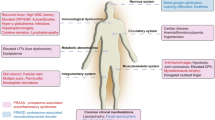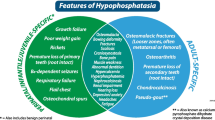Abstract
Hereditary chronic pancreatitis (HCP) is a rare disease in which chronic pancreatitis develops in childhood. HCP has autosomal dominant inheritance with approximately 80% penetrance. Diagnostic criteria are not universally agreed upon but the EUROPAC trial defined it as two first-degree relatives or at least 3 second-degree relatives in two or more generations, with chronic pancreatitis for which there is no other etiology. The gene for HCP was originally identified on chromosome 7 and subsequently many other genes have been reported to be associated with HCP. To date, no single genetic alteration has been found that is necessary for the development of HCP. In a recent study, 81% of patients with HCP were found to have a mutation of the PRSS1 gene. Patients with HCP are at risk for developing exocrine and endocrine insufficiency and there is a 50-fold increased risk of pancreatic cancer in HCP patients as compared with the general population.
Similar content being viewed by others
References
Howes N, Lerch MM, Greenhalf W et al (2004) Clinical and genetic characteristics of hereditary pancreatitis in Europe. Clin Gastroenterol Hepatol 2(3):252–261
Comfort MW, Steinberg AG (1952) Pedigree of a family with hereditary chronic relapsing pancreatitis. Gastroenterology 21(1):54–63
Whitcomb DC (1999) Hereditary pancreatitis: new insights into acute and chronic pancreatitis. Gut 45(3):317–322
Le Bodic L, Bignon JD, Raguenes O et al (1996) The hereditary pancreatitis gene maps to long arm of chromosome 7. Hum Mol Genet 5(4):549–554
Pandya A, Blanton SH, Landa B et al (1996) Linkage studies in a large kindred with hereditary pancreatitis confirms mapping of the gene to a 16-cM region on 7q. Genomics 38(2):227–230
Whitcomb DC, Preston RA, Aston CE et al (1996) A gene for hereditary pancreatitis maps to chromosome 7q35. Gastroenterology 110(6):1975–1980
Whitcomb DC, Gorry MC, Preston RA et al (1996) Hereditary pancreatitis is caused by a mutation in the cationic trypsinogen gene. Nat Genet 14(2):141–145
Lowenfels AB, Maisonneuve P, DiMagno EP et al (1997) Hereditary pancreatitis and the risk of pancreatic cancer. International Hereditary Pancreatitis Study Group. J Natl Cancer Inst 89(6):442–446
Keim V, Bauer N, Teich N, Simon P, Lerch MM, Mossner J (2001) Clinical characterization of patients with hereditary pancreatitis and mutations in the cationic trypsinogen gene. Am J Med 111(8):622–626
Sibert JR (1978) Hereditary pancreatitis in England and Wales. J Med Genet 15(3):189–201
Rosendahl J, Bodeker H, Mossner J, Teich N (2007) Hereditary chronic pancreatitis. Orphanet J Rare Dis 2:1
Etemad B, Whitcomb DC (2001) Chronic pancreatitis: diagnosis, classification, and new genetic developments. Gastroenterology 120(3):682–707
Ammann RW (2006) Diagnosis and management of chronic pancreatitis: current knowledge. Swiss Med Weekly 136:166–174
O’Neill JA Jr, Greene H, Grishan FK (1982) Surgical implications of chronic pancreatitis. J Pediatr Surg 17(6):920–926
Atlas AB, Orenstein SR, Orenstein DM (1992) Pancreatitis in young children with cystic fibrosis. J Pediatr 120(5):756–759
Shwachman H, Lebenthal E, Khaw KT (1975) Recurrent acute pancreatitis in patients with cystic fibrosis with normal pancreatic enzymes. Pediatrics 55(1):86–95
Wilson DE, Hata A, Kwong LK et al (1993) Mutations in exon 3 of the lipoprotein lipase gene segregating in a family with hypertriglyceridemia, pancreatitis, and non-insulin-dependent diabetes. J Clin Invest 92(1):203–211
Trump D, Whyte MP, Wooding C et al (1995) Linkage studies in a kindred from Oklahoma, with familial benign (hypocalciuric) hypercalcaemia (FBH) and developmental elevations in serum parathyroid hormone levels, indicate a third locus for FBH. Hum Genet 96(2):183–187
Jackson CE (1958) Hereditary hyperparathyroidism associated with recurrent pancreatitis. Ann Intern Med 49(4):829–836
Kamisawa T, Egawa N, Nakajima H, Tsuruta K, Okamoto A, Kamata N (2003) Clinical difficulties in the differentiation of autoimmune pancreatitis and pancreatic carcinoma. Am J Gastroenterol 98(12):2694–2699
Sarles H, Sarles JC, Muratore R, Guien C (1961) Chronic inflammatory sclerosis of the pancreas–an autonomous pancreatic disease? Am J Dig Dis 6:688–698
Clifton MS, Pelayo JC, Cortes RA et al (2007) Surgical treatment of childhood recurrent pancreatitis. J Pediatr Surg 42(7):1203–1207
Witt H, Luck W, Becker M (1999) A signal peptide cleavage site mutation in the cationic trypsinogen gene is strongly associated with chronic pancreatitis. Gastroenterology 117(1):7–10
Teich N, Ockenga J, Hoffmeister A, Manns M, Mossner J, Keim V (2000) Chronic pancreatitis associated with an activation peptide mutation that facilitates trypsin activation. Gastroenterology 119(2):461–465
Ferec C, Raguenes O, Salomon R et al (1999) Mutations in the cationic trypsinogen gene and evidence for genetic heterogeneity in hereditary pancreatitis. J Med Genet 36(3):228–232
Selig L, Sack U, Gaiser S et al (2006) Characterisation of a transgenic mouse expressing R122H human cationic trypsinogen. BMC Gastroenterol 6:30
Archer H, Jura N, Keller J, Jacobson M, Bar-Sagi D (2006) A mouse model of hereditary pancreatitis generated by transgenic expression of R122H trypsinogen. Gastroenterology 131(6):1844–1855
Witt H, Sahin-Toth M, Landt O et al (2006) A degradation-sensitive anionic trypsinogen (PRSS2) variant protects against chronic pancreatitis. Nat Genet 38(6):668–673
Witt H, Luck W, Becker M et al (2001) Mutation in the SPINK1 trypsin inhibitor gene, alcohol use, and chronic pancreatitis. JAMA 285(21):2716–2717
Drenth JP, te Morsche R, Jansen JB (2002) Mutations in serine protease inhibitor Kazal type 1 are strongly associated with chronic pancreatitis. Gut 50(5):687–692
Chandak GR, Idris MM, Reddy DN, Bhaskar S, Sriram PV, Singh L (2002) Mutations in the pancreatic secretory trypsin inhibitor gene (PSTI/SPINK1) rather than the cationic trypsinogen gene (PRSS1) are significantly associated with tropical calcific pancreatitis. J Med Genet 39(5):347–351
Hassan Z, Mohan V, Ali L et al (2002) SPINK1 is a susceptibility gene for fibrocalculous pancreatic diabetes in subjects from the Indian subcontinent. Am J Hum Genet 71(4):964–968
Bhatia E, Choudhuri G, Sikora SS et al (2002) Tropical calcific pancreatitis: strong association with SPINK1 trypsin inhibitor mutations. Gastroenterology 123(4):1020–1025
Schneider A, Suman A, Rossi L et al (2002) SPINK1/PSTI mutations are associated with tropical pancreatitis and type II diabetes mellitus in Bangladesh. Gastroenterology 123(4):1026–1030
Noone PG, Zhou Z, Silverman LM, Jowell PS, Knowles MR, Cohn JA (2001) Cystic fibrosis gene mutations and pancreatitis risk: relation to epithelial ion transport and trypsin inhibitor gene mutations. Gastroenterology 121(6):1310–1319
Cohn JA, Neoptolemos JP, Feng J et al (2005) Increased risk of idiopathic chronic pancreatitis in cystic fibrosis carriers. Hum Mutat 26(4):303–307
Kandula L, Whitcomb DC, Lowe ME (2006) Genetic issues in pediatric pancreatitis. Curr Gastroenterol Rep 8(3):248–253
Lowenfels AB, Maisonneuve P, Whitcomb DC, Lerch MM, DiMagno EP (2001) Cigarette smoking as a risk factor for pancreatic cancer in patients with hereditary pancreatitis. JAMA 286(2):169–170
Rulyak SJ, Lowenfels AB, Maisonneuve P, Brentnall TA (2003) Risk factors for the development of pancreatic cancer in familial pancreatic cancer kindreds. Gastroenterology 124(5):1292–1299
Jackson WD (2001) Pancreatitis: etiology, diagnosis, and management. Curr Opin Pediatr 13(5):447–451
Allendorph M, Werlin SL, Geenen JE et al (1987) Endoscopic retrograde cholangiopancreatography in children. J Pediatr 110(2):206–211
DuBay D, Sandler A, Kimura K, Bishop W, Eimen M, Soper R (2000) The modified Puestow procedure for complicated hereditary pancreatitis in children. J Pediatr Surg 35(2):343–348
Austin JL, Roberts C, Rosenholtz MJ, Reber HA (1980) Effects of partial duct obstruction and drainage of pancreatic function. J Surg Res 28(5):426–433
Layer P, Yamamoto H, Kalthoff L, Clain JE, Bakken LJ, DiMagno EP (1994) The different courses of early- and late-onset idiopathic and alcoholic chronic pancreatitis. Gastroenterology 107(5):1481–1487
Malka D, Hammel P, Maire F et al (2002) Risk of pancreatic adenocarcinoma in chronic pancreatitis. Gut 51(6):849–852
Author information
Authors and Affiliations
Corresponding author
Rights and permissions
About this article
Cite this article
Lal, A., Lal, D.R. Hereditary pancreatitis. Pediatr Surg Int 26, 1193–1199 (2010). https://doi.org/10.1007/s00383-010-2684-4
Accepted:
Published:
Issue Date:
DOI: https://doi.org/10.1007/s00383-010-2684-4




